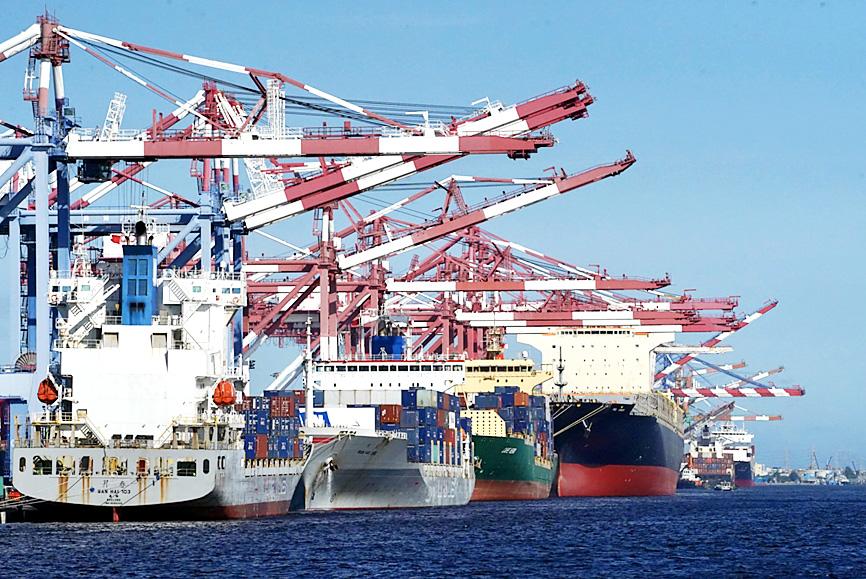Exports last month surged 35.1 percent year-on-year to US$36.65 billion, the second-highest level in history, as demand for electronics remained strong, while a low base meant that non-technology products posted faster growth, the Ministry of Finance said yesterday.
The improving global economy accounted for the impressive showing that is likely to extend into the second half of the year with the arrival of the high sales season, Department of Statistics Director-General Beatrice Tsai (蔡美娜) told an online news conference in Taipei.
“‘Hot’ is the most appropriate word to characterize the state of exports,” Tsai said, forecasting an upswing of 29 to 33 percent for this month year-on-year.

Photo: CNA
In the second quarter, exports grew 37.4 percent year-on-year to US$1.09 billion, while imports rose 36.4 percent to US$915.3 million, both beating last month’s forecasts by the Directorate-General of Budget, Accounting and Statistics.
That suggests that the nation’s export-focused economy is likely to emerge from the domestic COVID-19 outbreak unscathed, despite a sharp decline in consumer activity.
Outbound shipments of electronic products last month grew 29.8 percent to a record US$14.51 billion, as demand for chips hit a new peak, Tsai said.
Exports of optical products, including flat panels and camera lenses, rose 29.5 percent to US$1.12 billion, data showed.
Smartphone camera lens maker Largan Precision Co (大立光) earlier this week said that its sales would pick up this month after an 18.51 percent year-on-year fall last month due to the slow season and the loss of major client Huawei Technologies Co (華為).
Shipments of plastic, base metal, chemical and mineral products registered steeper growth of 46.6 to 87.4 percent, as local firms benefited from increased infrastructure spending by the US and other nations, Tsai said, adding that a low base last year also lent support.
Exports to China, ASEAN, Japan, the US and Europe all grew by double-digit percentage points as vaccination programs enabled the world to gradually shake off the threat of the COVID-19 pandemic.
Imports last month surged 42.3 percent to US$31.51 billion, giving Taiwan a trade surplus of US$5.1 billion, data showed.
Imports of agricultural and industrial materials grew 51.8 percent to US$21.95 billion, while imports of capital equipment increased 24.5 percent to US$5.5 million, the ministry said, adding that local technology firms are expanding their capacity to meet demand.
In the first six months of the year, exports advanced 31 percent year-on-year to US$206.91 billion, while imports expanded 28.6 percent to US$175.1 billion, the ministry said, while adding that uncertainty remains due to the spread of more transmissible variants of SARS-CoV-2.

Sweeping policy changes under US Secretary of Health and Human Services Robert F. Kennedy Jr are having a chilling effect on vaccine makers as anti-vaccine rhetoric has turned into concrete changes in inoculation schedules and recommendations, investors and executives said. The administration of US President Donald Trump has in the past year upended vaccine recommendations, with the country last month ending its longstanding guidance that all children receive inoculations against flu, hepatitis A and other diseases. The unprecedented changes have led to diminished vaccine usage, hurt the investment case for some biotechs, and created a drag that would likely dent revenues and

Macronix International Co (旺宏), the world’s biggest NOR flash memory supplier, yesterday said it would spend NT$22 billion (US$699.1 million) on capacity expansion this year to increase its production of mid-to-low-density memory chips as the world’s major memorychip suppliers are phasing out the market. The company said its planned capital expenditures are about 11 times higher than the NT$1.8 billion it spent on new facilities and equipment last year. A majority of this year’s outlay would be allocated to step up capacity of multi-level cell (MLC) NAND flash memory chips, which are used in embedded multimedia cards (eMMC), a managed

CULPRITS: Factors that affected the slip included falling global crude oil prices, wait-and-see consumer attitudes due to US tariffs and a different Lunar New Year holiday schedule Taiwan’s retail sales ended a nine-year growth streak last year, slipping 0.2 percent from a year earlier as uncertainty over US tariff policies affected demand for durable goods, data released on Friday by the Ministry of Economic Affairs showed. Last year’s retail sales totaled NT$4.84 trillion (US$153.27 billion), down about NT$9.5 billion, or 0.2 percent, from 2024. Despite the decline, the figure was still the second-highest annual sales total on record. Ministry statistics department deputy head Chen Yu-fang (陳玉芳) said sales of cars, motorcycles and related products, which accounted for 17.4 percent of total retail rales last year, fell NT$68.1 billion, or

In the wake of strong global demand for AI applications, Taiwan’s export-oriented economy accelerated with the composite index of economic indicators flashing the first “red” light in December for one year, indicating the economy is in booming mode, the National Development Council (NDC) said yesterday. Moreover, the index of leading indicators, which gauges the potential state of the economy over the next six months, also moved higher in December amid growing optimism over the outlook, the NDC said. In December, the index of economic indicators rose one point from a month earlier to 38, at the lower end of the “red” light.